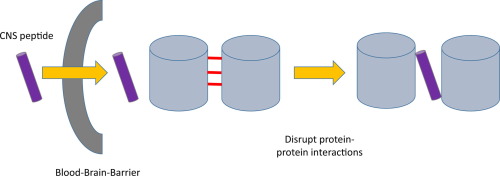Bioorganic & Medicinal Chemistry ( IF 3.3 ) Pub Date : 2017-09-09 , DOI: 10.1016/j.bmc.2017.09.011 Bruce H. Morimoto

|
Attacking neurodegeneration and promoting neuroprotection have been the holy grail in neurology for almost 20 years and represent an area of high unmet medical need. However, indications like Alzheimer’s disease and stroke are areas in drug development fraught with failure. This review will highlight three CNS peptide programs which are tackling targets and indications in which traditional small molecule approaches have been difficult and challenging. The targets for these potential peptide therapeutics include the NMDA receptor, γ-secretase, and cyclin-dependent kinase in which direct inhibition has resulted in on-target (not compound related) problems. For example, direct inhibition of γ-secretase has resulted in gastrointestinal abnormalities and inhibition of the NMDA receptor can result in hallucinations, dizziness, out-of-body sensations, and nightmares. When confronted with show-stopping side effects, the CNS peptide programs profiled in this review strike the problem with intervention and disruption of selective protein-protein interactions. The goal of these peptide programs is to produce selective therapeutics with a better safety profile.
中文翻译:

用于中枢神经系统适应症的治疗性肽:进展和挑战
攻击神经变性和促进神经保护已成为神经病学近20年的圣杯,并且代表了高度未满足的医疗需求领域。但是,像阿尔茨海默氏病和中风这样的适应症是药物开发中充满失败的领域。这篇综述将重点介绍三个CNS肽程序,这些程序是解决传统小分子方法困难且具有挑战性的目标和适应症。这些潜在的肽治疗剂的靶标包括NMDA受体,γ-分泌酶和细胞周期蛋白依赖性激酶,其中直接抑制已导致靶标问题(与化合物无关)。例如,直接抑制γ-分泌酶会导致胃肠道异常,而抑制NMDA受体会导致幻觉,头晕,机体不适,和噩梦。当面临令人震惊的副作用时,本综述中概述的CNS肽程序可解决选择性蛋白-蛋白相互作用的干预和破坏问题。这些肽程序的目标是生产具有更好安全性的选择性治疗剂。











































 京公网安备 11010802027423号
京公网安备 11010802027423号